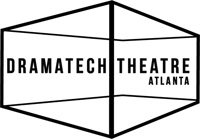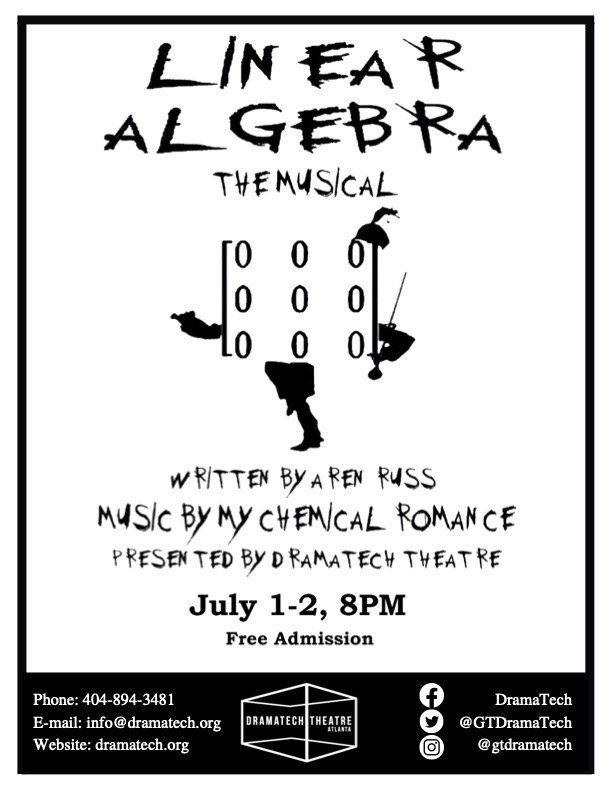What: Linear Algebra: The Musical
When: Opening night Friday, July 1st at 8pm. Second and final performance Saturday, July 2nd at 8pm.
Where: Dramatech Theater, 349 Ferst Dr NW, Atlanta, GA 30332, in between the Boggs building and the Student Center.
Why: It's a musical about linear algebra... !
Who: Everyone! Admission is free.
Eight actors and a dozen theater tech enthusiasts will put on what is bound to be a joyful romp through a dystopian futuristic world populated by matrices, where your societal rank is equal to your matrix rank. Dramatech is Tech's on-campus, student run theater company and their newest offering is a jukebox musical written by Tech student Aren Russ, Linear Algebra: The Musical, a rising fourth-year physics major who first started writing the script as a study guide to Dr. Mayer's Spring 2019 class, Math 1554 Linear Algebra.
We had an opportunity to chat with the playwright about how this amazing musical was created and to get a glimpse into what anyone attending the performance can expect. Here is what we found out.
Q: So, Linear Algebra: The Musical, how did this happen.
About 2 years ago I took Math 1554 Linear Algebra the four hour version, with Dr. Mayer. I'm a physics major so I wanted to take the longer version for when I would need it for quantum [mechanics]. I was trying to memorize all the definitions for the final exam, and I memorize scripts a lot easier than I can memorize pages of notes, so I jokingly said I should just write a script about linear algebra. So just opened a word document and at the top I jokingly wrote Linear Algebra: The Musical, and this title was too funny to not do anything with.
Q: Completely agree. Is that when you wrote the play?
About a year later, Dramatech was looking for student works to do readings. I went back and found what I had done before and then wrote [the play] over the course of 3 days, it was a very interesting period of my life. I realized about a day into it, that it needed to be a musical and so I needed songs. The song "Teenagers" by My Chemical Romance came on the radio and I could picture the characters of the story singing the songs.
Q: Can you tell us a bit about the plot?
The plot centers around four zero matrices who live in a dystopian future where your matrix rank determines your societal rank. So since their rank is zero they are at the bottom and they are all edgy and angsty about it. It's implied that every five years you add another row or column [to your matrix]. The whole society is led by the identity matrices because they are the top dogs, and so you see the journey of these zero matrices working through society and trying to find a place for themselves, and working to make a statement for the rights of zero matrices, and you end up finding out by the end that zero matrices are already pretty interesting: they are already in reduced echelon form, they are diagonalizable, basically they are already perfect matrices, and the identity matrix was hiding that because he wanted to be the only perfect matrix and not them.
Q: Do matrices get to rank up in your world, or are they stuck with the same rank forever and I guess they just learn to accept it?
It's implied that the rank that you are around graduating high school is the same rank that you are going to be regardless of how you age.
Q: How did you come up with the jokes in the play?
A lot of the jokes were me just going back to the linear algebra notes and seeing terms, things that I enjoyed in the class, and then working them into the script and basing characters off of them or just writing little throw away lines. I ended up doing a motif where I would take pop culture references, and change one thing about them to be linear algebra themed. So for example, one of the characters mentions an artist named Megan The Subspace, and there is a party where they drink SmirNULL Ices (instead of Smirnoff Ice).
Q: Was this your first play that you wrote?
I have written quite a few plays and musicals, but this is the first one that I've actually found a space and opportunity to perform. And so I've had the time to really rewrite it and polish it. Most of my other works are less campy and jokey, and it is much harder to find a space to perform them. They either require a lot of technical aspects or they are just relatively serious intense topics that are not really the vibe of Dramatech.
Q: So you are a physics major, and you write plays for fun?
I do a lot of things with my life. I'm a physics major but i want to go into meteorology, and I love writing but I do a ton of art. I'm a professional artist, doing art is my main source of income. I'm also working with a graphic design marketing job, and then the writing has just been a side hobby up until now.
Q: What is the Dramatech community like?
The community is wonderful, I love all of them so much, they are such a welcoming and accepting group of people who let you put on shows like Linear Algebra: The Musical.
There are about 8 actors, and 12 tech people. We of course have a lot more tech theater kids than on stage actor kids, and being at Dramatech we often find ways to incorporate our love for the sciences and engineering into the theater productions that we do. So we have a lot of people that are interested in lighting design, we have a master electrician, a master carpenter and we often end up with some really cool set builds.
We work 6pm-10pm pretty much every night. The actors have been doing an amazing job memorizing their lines and learning the seven songs in the musical.
Q: What was the experience like going from your written play to a living breathing production, or did things pretty much stay the same as how you were originally envisioning?
It's been really cool to see how [the show] changes from my mental image to actually being on the stage. The cast that I got they are amazing, I love them all so much. Casting was a bit of a struggle, it's a minimum of 8 people but only 7 people signed up and some people were dropping last minute but eventually we got one freshmen and one third year who are here for the summer recruitment events, they are noobies to Dramatech. But casting-wise I just put people in random roles based on their vocal range and how much theater experience that they had, and I ended up casting them as themselves. So all of the actors are playing their exact type, playing pretty much their own personality on stage.
Q: What was it about Math 1554 Linear Algebra that made you want to create the musical?
First of all, I loved [Dr. Mayer's] class he was an amazing teacher. The content, well, not my favorite math course I've ever taken - I'm much more of a differential calculus kind of person. But he made it really palatable and fun to learn despite it being at 8am. And I was having trouble memorizing all the different terms and all the different definitions, because there were so many different ways to classify everything and so many different methods of processing everything, and I was trying to think of fun ways to memorize everything. And I was putting everything into a word document and I thought it would be a good joke to write a script about it, and then it wasn't a joke.
It was a series of funny, one line jokes that I had: your matrix rank equals determines societal rank, and a couple other bitty style one-liners, that I just sat down and over the course of three days just kind of made a script out of it.
Q: Are your other plays also science or math based?
I've spent a nonzero amount of my life practicing bridging scientific topics with artistic things, being an artist myself who does a lot of drawing, illustration, writing, and painting and other forms of art. Pretty much as long as I can remember I have always been doodling characters based on the elementary [classical physics] model, or super heroes based on the periodic table, so it was surprisingly in my wheelhouse to transfer these linear algebra concepts into an art form. Understanding them from a logical on-paper standpoint, and then using that understanding to create an artistic impression of them.
Q: That's actually really cool. Can you explain that a bit more?
I think it comes from my love for the two fields. My love for the pure sciences and the pure arts, and wanting to do the two things - not wanting to have to choose between the two things I love. So it's kind of driven out of necessity, almost, the necessity to not have to give up either aspect of myself. I was raised on shows like Mythbusters and Magic Schoolbus which are art-forms that portray scientific concepts and I absolutely loved those growing up. And I guess I wanted to kind of do that in my own way. Like in high school I would explain what a photon is by showing my friends a silly little doodle of an anime girl who can fly through walls because she has no mass.
Q: I absolutely love that, and I'm super excited to go see the show!
Seeing the interest that people have in this, because I didn't know that anyone would even be interested in this kind of thing. So I genuinely didn't realize there were so many people on this campus interested in bridging the two [art and science]. I think people just enjoy getting to see this thing that they spent hours of their life studying and pouring themselves into in a much more fun, lighthearted, and low stakes format with fun songs and dance, lights and costumes.
Now that I've discovered the shared interest people have in bridging art and these scientific ideas, I'm hoping to bring more stuff like this to campus in this final year that I have here.




